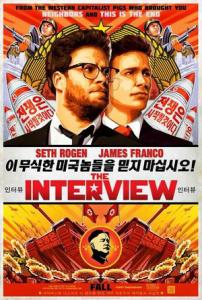The Dartmouth’s asinine editorial train is running at full speed only days into winter term.
“Addressing the Atrocities” – penned by Annika Park ’18 – takes an interesting stance on the furor surrounding the tumultuous release of The Interview, the North Korea spoof starring Seth Rogen and James Franco. She argues that the film was ultimately unwarranted and unjustified, as Supreme Leader Kim Jong-Un ought not to be a target of satire.
“The issue with creating a movie about an existing dictator,” argues Ms. Park, “rather than a fictional one, is that it rests on a foundation of derision and judgment.”
Well, for one, even if Mr. Rogen and Mr. Franco had used a fictional dictator, it would have been abundantly clear who they would have been spoofing. When Charlie Chaplin played Adenoid Hynkel in the 1940 satire The Great Dictator, only the thickest of moviegoers thought of anyone but Adolf Hitler.
But more importantly: don’t the North Korean regime and its leader deserve our derision? A regime whose single-minded pursuit of nuclear weapons has starved and alienated its people from the world?
No, says Ms. Park. “It’s appalling to see a commercial movie production company have the nerve to turn the plight of the people surviving day by day under the Kim family dictatorship into a comedic plot.”
Personally, I find it more appalling that our daily campus newspaper should publish an editorial calling for censorship. This is no isolated instance; in November, they published another which advocated “fixing” freedom of speech. (By fixing, naturally, they meant ending.)
I wonder if Ms. Park ever stopped to consider exactly why the North Korean regime was so thoroughly aggrieved by the release of The Interview. Surely it cannot have been solely put off by the stereotypical portrayal of North Koreans alone; otherwise, it would have protested at the 2012 release of Red Dawn, which depicted a future North Korean invasion of the United States.
The difference, of course, is that Red Dawn portrayed a militant, unduly powerful North Korean state, with the ability to stage a cross-Pacific invasion of the 300-million strong United States. The Interview showed an uncontrollably weeping Kim Jong-Un killed by a hapless American journalist.
The North Korean regime, plain and simple, is afraid of its citizens possibly discovering that it is regarded worldwide as something of a joke. Its domestic legitimacy stems in large part from its convincing North Koreans that the West genuinely fears it, assuring them that food shipments to the barren country are not aid but “tribute.”
The Interview, mediocre though it is, is seen by the regime as a threat precisely because it “reduces the regime to a joke,” as Ms. Park despondently notes. Which, again, is a good thing: the despotic North Korean regime ought to be ended, not to be catered to (not that the latter has ever done much good anyway). We ought to be condescending because the regime deserves every bit of our condescension.
There’s a reason why Islamic terrorists just stormed a satirical magazine in Paris, killing cartoonists who had dared to lampoon their wretched jihad, and there’s a reason why scores of Eastern European satirists were silenced or exiled during the Cold War. The despots of the world fear laughter at their expense more than anything else, because it pokes at their seemingly impenetrable veneers and suggests the existence of something different, something better. Nothing frightens them more than the public suggestion of alternatives.
Our democratic responsibility, if not to inculcate such satire, is at the very least to ensure that it can be freely and safely disseminated. Too many figures and institutions today – from Ms. Park and The Dartmouth to the publications who refuse to show unpixelated versions of the cartoons that ultimately condemned five brave French satirists to their deaths – are flirting heavily with abdicating it.


Be the first to comment on "The Dartmouth is Wrong on North Korea"